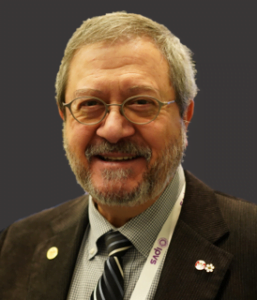SER Member Insight: Eduardo L. Franco, MPH, DrPH, PhD (Hon)
 Where is your academic home base?
Where is your academic home base?
I have been a faculty member at McGill University since 1990. Given my focus on cancer epidemiology, I have primary and joint appointments in the Department of Oncology and the Department of Epidemiology, Biostatistics, and Occupational Health. My interest in cancers associated with human papillomavirus infection has also rewarded me with cross-appointments in ObGyn, Dentistry, and Pathology. McGill is in Montreal, Canada. It is an Ivy-League caliber university. My American colleagues say McGill is the Harvard of the North—Montrealers like to say that Harvard is the McGill of the South. Montreal is one of the nicest cosmopolitan cities you can visit. Canadian in spirit, yet decidedly French at heart, Montreal boasts a cosmopolitan flare that is internationally renowned. Montreal is well known for its quality of life, safe streets, friendly atmosphere, gourmet restaurants, and sidewalk cafes. It hosted major epidemiology events, including the International Epidemiological Association’s World Congress of Epidemiology in 2002 and the 2010 North America Epidemiology Congress.
What sparked your decision to become an epidemiologist?
I was trained as a microbiologist but always liked epidemiology because it allows me to observe health risks from a population perspective. When I had the opportunity to learn the toolbox of epidemiology, I never looked back, although I am very grateful for my basic science training.
What do you see as the biggest obstacle facing epidemiologists in the next five years?
To a large extent, the threats that science and scientists face today should be our biggest concern. We face a credibility crisis with the public. Major scientific findings are not reproduced and the public learns that very quickly, thanks to the Internet’s reach since the late 1990s. The COVID-19 pandemic placed epidemiology at center stage and not all was good. Our work validating primary prevention strategies, such as vaccination against important infectious diseases, is constantly opposed by pseudo-science activism. The publish-or-perish ethos of science in the last seven decades must change. We need new paradigms to foster good behaviors and scholarship in our early career scientists. This is true for epidemiology and any field of scientific endeavor.
Do you have any pets?
I have a very cute 14-year-old dog named Bear. His breed is a cross between a poodle and a Japanese chin.
Why did you join SER? What keeps you coming back?
I became an SER member even before I moved to Canada while I was a junior epidemiologist in Sao Paulo, Brazil. SER meetings are great events where you can learn from the best. I was proud to have served on AJE’s editorial board from 1993 to 98 and landed some of my best work there.
What advice do you give students who want to become epidemiologists?
Nurture the passion that made you want to have a career as a scientist. There is honor and distinction in producing the knowledge that will improve our world and society’s well-being. Be a good citizen of the scientific community and uphold the values of the profession. Find a specialty area that gives you pleasure in learning. Excellence comes from being focused. Finally, in addition to excellence and persistence, try to be in the right place at the right time and take advantage of the opportunities that will come your way.
Outside of epidemiology what do you enjoy doing?
I enjoy spending time with my family, and I have children and grandchildren near and afar, which means I travel a lot.
What is something that not many people know about you?
I am just ending my two-year term as president of the Canadian Society for Epidemiology and Biostatistics, SER’s sister society north of the border. I will begin in September my duties as president-elect of the International Epidemiological Association, another great partner of SER.
